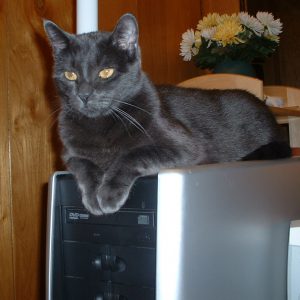 There was no warning. Monday my beautiful cat Cricket was fine. Tuesday she didn’t come to get her breakfast – I called her from the kitchen first, as usual, and when she didn’t show up I figured she wanted her food upstairs. I went up to my office door and called again, but still she didn’t appear. Not till I sat down at my desk did I see her, way back under the desk. I’m unable to kneel so I couldn’t get her out, but I was able to put the cat food bowl near her. After a few minutes she got up, sniffed at it, and walked past it, settling down still too far away for me to see her. As she is a very dark gray with black overtones, I couldn’t even get a good look at her.
There was no warning. Monday my beautiful cat Cricket was fine. Tuesday she didn’t come to get her breakfast – I called her from the kitchen first, as usual, and when she didn’t show up I figured she wanted her food upstairs. I went up to my office door and called again, but still she didn’t appear. Not till I sat down at my desk did I see her, way back under the desk. I’m unable to kneel so I couldn’t get her out, but I was able to put the cat food bowl near her. After a few minutes she got up, sniffed at it, and walked past it, settling down still too far away for me to see her. As she is a very dark gray with black overtones, I couldn’t even get a good look at her.
I was concerned, but the last time she got lethargic and I took her to the vet, they couldn’t find anything special wrong with her, and the next day she was fine again. It was an expensive visit because they did a lot of blood work, so I wasn’t going to make the same mistake again. I’d wait and see how long the lethargy lasted.
At the Shelter, She Chose Us
Back in 2005, when I was going through a bad bout of depression, a good friend told me, “You need to be needed.” Now, I hadn’t had a cat since 1991, when my beloved Tommy died, and immediately I knew that it was time to get another – way overdue, in fact. So with my brother and his family, who had adopted their cats from Orphans of the Storm, and my elderly mother and I, who lived together, went to the shelter intending to get a male cat. (I wanted a male because I’d had a female die after being spayed, and because Tommy had been so sweet.)
Mom was 82 and had to sit on a chair in the huge cat room. I looked at the caged cats and found the girl who would eventually be named Lucy Lockett because she was coal black except for a white star on her breast. She was 8 years old and had been returned to the shelter once already for litter box problems. “These are easily fixable!” said the sign over the cage. “Give her a chance!” Well, I’m a sucker for something like that, and picked her out.
But when I got back to my brother and said, “I want this one,” he looked dismayed. “Mom already picked one,” he said. “Well then, we’ll have to get two,” was my prompt reply. Hers, too, was a female, a gray-black kitten – who wasn’t a kitten.
 Cricket had been a stray brought to the shelter only a few days earlier – on my birthday, in fact. Though she looked so small, it was because she had been starving – she weighed only 4½ pounds, although she was estimated to be two years old.
Cricket had been a stray brought to the shelter only a few days earlier – on my birthday, in fact. Though she looked so small, it was because she had been starving – she weighed only 4½ pounds, although she was estimated to be two years old.
In the cat room, she had jumped into my mother’s lap, nuzzled her head under Mom’s chin, then settled down contentedly. She couldn’t have said, “You are my human” any more clearly than that.
Almost immediately after we got her home, she developed severe rhinitis (not unusual in shelter cats when they change environment) that went into an eye infection. Thanks to the receptionist’s refusal to let her see the vet on an emergency basis, the infection got quite bad by the time I could get her in, and she carried a scar on her cornea for the rest of her life.
Lucy’s name had been natural, but I had a hard time naming Cricket. It wasn’t till I realized I’d been calling her “little bug” that “Cricket” came to mind, and Cricket she was.
Cricket and Lucy
 Lucy was an alpha cat. In spite of being very much smaller, she bossed Cricket around unmercifully. Lucy was Queen, Cricket was her lowly servant. Cricket would come to the door to tell me Lucy was hungry – absolutely true story. Cricket was not allowed to sleep on my bed because that was Lucy’s Domain. This was fine while my mother was alive and healthy – Cricket slept on her bed. But after Mom had a colostomy, neither cat wanted to be close to her. Eventually the colostomy was reversed in favor of a resection, but Mom’s health went downhill rapidly after having had six surgeries in nine months, and she went into the hospital, then hospice, almost exactly two years after we had adopted the cats. Cricket had to sleep by herself.
Lucy was an alpha cat. In spite of being very much smaller, she bossed Cricket around unmercifully. Lucy was Queen, Cricket was her lowly servant. Cricket would come to the door to tell me Lucy was hungry – absolutely true story. Cricket was not allowed to sleep on my bed because that was Lucy’s Domain. This was fine while my mother was alive and healthy – Cricket slept on her bed. But after Mom had a colostomy, neither cat wanted to be close to her. Eventually the colostomy was reversed in favor of a resection, but Mom’s health went downhill rapidly after having had six surgeries in nine months, and she went into the hospital, then hospice, almost exactly two years after we had adopted the cats. Cricket had to sleep by herself.
My mother died in December 2007, which meant her house had to be sold as part of the estate, and I had to find a new home. 2008 was a very rough year, but it culminated in my finding a house that had almost everything I wanted (no luxury bathroom). The cats and I moved in at the end of October. Since I had been working from home since late in 2005, they didn’t have to spend all day alone.
Cricket and Lucy and Buzz
Although she had nestled in Mom’s lap, Cricket preferred to be held up against my chest, with her head just above my shoulder and her wicked claws holding onto my sweatshirt. I had to wear sweatshirts all the time because of this – she’d spike me right through a t-shirt. Very often she would start to groom my hair and wash my ear with her tongue.
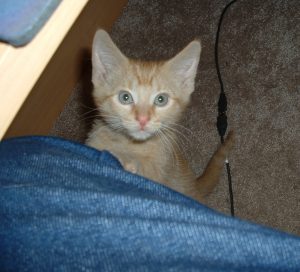 This made me think maybe she needed a baby to care for, so in 2009 I went back to the shelter and got an orange tabby male kitten. Because of his triangular face, I wanted to call him Ming the Merciless, but he kept insisting – by his loud, loud purr – that his name was Buzz.
This made me think maybe she needed a baby to care for, so in 2009 I went back to the shelter and got an orange tabby male kitten. Because of his triangular face, I wanted to call him Ming the Merciless, but he kept insisting – by his loud, loud purr – that his name was Buzz.
Lucy wanted absolutely nothing to do with him – she ignored him to the end of her life. And Cricket did not want to mother him. Once he grew up, they batted at each other, sometimes wrestled. During these sessions, which she actually seemed to enjoy, she growled and hissed the whole time. Buzz was confused by this; so was I. Anyway, time passed and he grew to be the biggest of the three by far.
Lucy
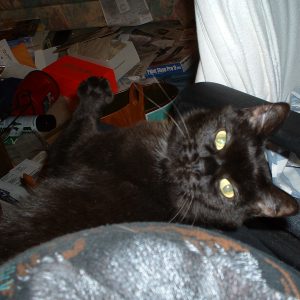 I’d never had any of the “litter box problems” mentioned on the sign at the shelter until the last year of Lucy’s life. It was apparent she was not in the best of health, but the vets couldn’t figure out what was wrong with her. They wanted more expensive tests. They wanted me to bring her in for blood work every two weeks. She’d already been to two different clinics four or five times at that point, finding nothing wrong, and I was fed up. She hated going to the vet – cried and peed in the carrier, peed all over the vet once. I just couldn’t afford to spend more and more without any results, and I didn’t want to keep traumatizing her. She was 17 years old then.
I’d never had any of the “litter box problems” mentioned on the sign at the shelter until the last year of Lucy’s life. It was apparent she was not in the best of health, but the vets couldn’t figure out what was wrong with her. They wanted more expensive tests. They wanted me to bring her in for blood work every two weeks. She’d already been to two different clinics four or five times at that point, finding nothing wrong, and I was fed up. She hated going to the vet – cried and peed in the carrier, peed all over the vet once. I just couldn’t afford to spend more and more without any results, and I didn’t want to keep traumatizing her. She was 17 years old then.
The only problem was that she would not use the litter box to pee. Under and behind the piano became her bathroom. She lived another year, only becoming obviously ill on her last day, and dying during the night. My best friend Hetty and I buried her in the garden.
(I had to get the living room carpet and padding completely replaced.)
Cricket’s Habits
Maybe because Lucy had died in the house, the other two cats didn’t seem fazed by her absence. But most of the time Cricket still wouldn’t sleep on my bed. Buzz did, though usually not for the whole night.
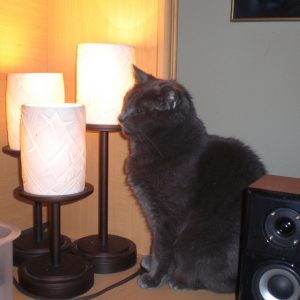 Cricket liked hidey-holes and warmth. She’d sleep between the toilet and the heat vent in the wall. She’d sleep on a towel on the floor behind the bathroom door. She wouldn’t eat near Buzz – partly because he’d come over to see if she had something better than he did.
Cricket liked hidey-holes and warmth. She’d sleep between the toilet and the heat vent in the wall. She’d sleep on a towel on the floor behind the bathroom door. She wouldn’t eat near Buzz – partly because he’d come over to see if she had something better than he did.
She developed the extremely annoying habit of eating a small portion of her breakfast, then coming to my office and staring at me, mewing eventually if I didn’t pay attention. It was move-the-food-bowl time. I’d bring the bowl upstairs and she’d eat some more; then I was required to move it to another position – perhaps downstairs again, perhaps ten feet away, perhaps 18 inches to the side. This went on all day. Boy, did she have me well-trained!
Scaredy-Cats
 Both of them were intensely shy about strangers and/or noisy people in the house, though Buzz was worse. Both would sometimes hide behind my waterbed; otherwise I’d find Buzz high up in the rafters behind the furnace and Cricket under my big heavy armchair.
Both of them were intensely shy about strangers and/or noisy people in the house, though Buzz was worse. Both would sometimes hide behind my waterbed; otherwise I’d find Buzz high up in the rafters behind the furnace and Cricket under my big heavy armchair.
If someone stayed with me for several days, Cricket would come out fairly soon and accept loving from the visitor. Buzz would take about 4 days before he’d let himself be seen by anyone but me.
Cricket became entirely comfortable and affectionate with Hetty. Buzz would (eventually) come out when Hetty visited, but he was always wary.
Cricket
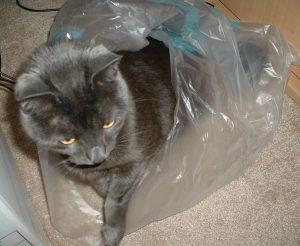 And so we come to 2017. Cricket was 14 now – qualifying as a “senior” cat but still active (especially when chasing the light of a laser toy) with a good appetite. Up until Tuesday, May 9th.
And so we come to 2017. Cricket was 14 now – qualifying as a “senior” cat but still active (especially when chasing the light of a laser toy) with a good appetite. Up until Tuesday, May 9th.
She slept under my desk for about six hours that day. When the room grew too warm, I opened up the balcony door, and when I turned around, she’d come out from under the desk to take a look. That’s when I saw how fast she was breathing – about 3 times a second.
It took only a short time searching “cat lethargy rapid breathing” for me to realize this was probably very serious. I called my vet, who advised me to take her to the veterinary specialty clinic about half an hour away as long as she wasn’t panting. She wasn’t panting, and I didn’t want to freak her out by putting her in the carrier, so I put a towel on the passenger seat (she likes towels), picked her up, and carried her downstairs. Halfway down she began howling and digging her viciously pointed claws in, and the howling got louder as we approached the door into the garage. Once we got into the garage she peed all down my front before I could get her into the car.
For both of us, the drive was a distraught trip. She did start panting, and did so for 8 or 9 minutes. I was on the tollway driving 75 mph with one hand on the wheel and the other reaching over and stroking her. By the time we left the tollway, she had stopped panting, but now we hit heavy traffic, and the total drive took 15 minutes longer than it would have been out of rush hour. She crawled over into my lap, took one look out the window and freaked out, making a sound I’d never heard from a cat before – I can’t even describe it, just pure terror. She started panting again. I put her back over on the towel, and gradually she calmed down.
Fragrant with frightened-cat urine, I took her into the clinic, where they took her off for an exam while I filled out the paperwork. Then I waited in the lounge until I was called.
The News Was All Bad
Her temperature, which ought to have been 102 or 103, was 95. That, along with poor pulses, indicated her heart couldn’t pump blood properly. The rapid breathing suggested fluid in the lungs. She was “a very sick little girl.”
“Unfortunately, with this condition there are no symptoms till a crisis occurs,” the veterinarian told me. Right now we have her on Lasix to try to move the water out and she’s in oxygen. But the prognosis is poor.”
I said, “I don’t want her to suffer.”
The vet said, “Is that your decision?” and for the first time I realized that I might have to make that decision that day.
The vet went on to tell me that if they could get her through this crisis, her life expectancy was only 6 to 9 months. I asked what her life would be like in those months. “Well, first we’d have to hospitalize her and get her stabilized – if we can. After that, you’d be medicating her two or three times a day. She’d have to come and see the cardiologist frequently. There could be side effects from the medications. She wouldn’t feel well.”
There was more than one illness that could cause her condition, and X-rays could help identify it. I wanted to know, so I authorized the X-rays and to hell with the cost.
The results were terrible. She had an enlarged heart and a LOT of fluid in the lungs as well as around the lungs and heart. I suppose it could be compared to the worst kind of congestive heart failure in a human, but I don’t really know.
The vet reiterated that she wasn’t sure whether they could even get Cricket through this crisis. Cricket’s condition, she said, was dire.
I knew what I had to do. I couldn’t let my little girl suffer. But oh my god it was hard. I hadn’t brought her there to die, I’d brought her to be treated. Not once had I thought that she wouldn’t get well. She was my sweetheart in spite of her needle-pointed claws and annoying little habits.
And I’d had no warning. She’d been fine the day before. I’d had no time to get used to the idea of losing her. My heart was breaking.
But there was a good side to that – it meant she’d had no warning, either. She had become sick suddenly and hadn’t been feeling bad at all until that day.
I looked at the vet, who was patiently and gently waiting. I knew she didn’t think Cricket would last the night if I left her there. I nodded. She went out, and I cried, and cried, and cried.
Saying Goodbye to Cricket
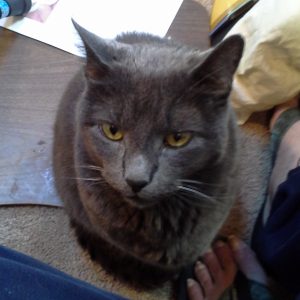 A technician came in. I signed a form. The technician checked me out in the room, so I wouldn’t have to go to the desk afterward. Then they brought Cricket, swathed in bedding into the room and put her in my arms so I could say goodbye. Ten minutes, I said.
A technician came in. I signed a form. The technician checked me out in the room, so I wouldn’t have to go to the desk afterward. Then they brought Cricket, swathed in bedding into the room and put her in my arms so I could say goodbye. Ten minutes, I said.
She was purring in those fast, fast breaths. I scratched her head and jaw the way she likes – liked – and talked to her. I told her we’d meet again someday – maybe in heaven, maybe in the Elysian Fields, maybe on the Rainbow Bridge, maybe in the vast pool of energy that is the Universe – and no matter where it was, we’d know each other. I didn’t cry. I talked to her for the whole ten minutes. And even though it wasn’t one of her common moves, she put her head up under my chin, just as she had done 12 years ago to my mother at the shelter, the reason we adopted her. “You are my human,” she told me. “And I love you.”
The door opened – the tech, checking on me – and again I nodded. They’d already explained the procedure to me. While I held her, they gave her a sedative through her IV. It acted fast. My beautiful little girl was asleep, so when they gave her the final medication, she could just drift away effortlessly.
I couldn’t watch that, though, so as arranged, they took her out, and again I wept terribly. Now for the first time I’m crying as I type this.
I’d told them I wanted her body, so they brought her out in a cardboard coffin. I wasn’t ready to see her, though I knew I’d want to before she was buried. The technician was kind enough to carry it to the car. She asked me if I was safe to drive. I knew I was.
Cricket in the Earth
Two days later my friend Hetty and I chose a site for her grave and began to dig. It wasn’t close to Lucy’s grave, since the two didn’t get along and Lucy had been so mean to her.
Because of my bad back, I couldn’t dig more than two shovelfuls of earth. Then I sat down and took the lid off the coffin. There she was, curled up, with a cotton blanket around most of her, looking like she was sleeping. I stroked her fur, and so did Hetty, who knew her so very well.
Then we laid her in the earth, wrapped in the blanket. I put the first shovelful of dirt into the grave; then, while Hetty finished, I went to look for bluestone pieces to put over her, to keep critters from digging her up. (We’d done this for Lucy, and her grave has never been disturbed.)
Once the small slabs had been placed, I went inside and brought out a small garden statue of a fairy and placed it. Then I did shed tears.
We decided to plant flowers around both graves. I had bought a pair of fiery red-orange coral bells a couple of weeks earlier. One was in a planter already; we placed the other by Cricket’s grave, then filled in around it with deep blue lobelias and white pansies. I didn’t have any perennials available for Lucy’s grave, so we put in annuals – orange calceolaria, more blue lobelia, and white petunias.
 Without Cricket
Without Cricket
Now it’s hard – there are so many reminders. There’s her bowl of dry food just outside my office door (Buzz will not touch kibble). There’s the sofa where she loved to nap with me (taking a nap there is really tough now – I miss her so!) or sit behind me and play with my hair. There’s sitting here at the computer where so often she wanted to be held against my shoulder while I played solitaire, which only needed the mouse hand so I could hold her with my left arm.
And there’s the loss of her almost silent purr that I could hear when holding her, since she was close to my left ear, and feel in her body.
I had already known that whenever I lost Cricket, it would be devastating. I just never expected it to be so soon.



I’m very sorry to hear about your kitty. This is a beautiful post. Thank you for sharing on #gardenchat Facebook group with us.